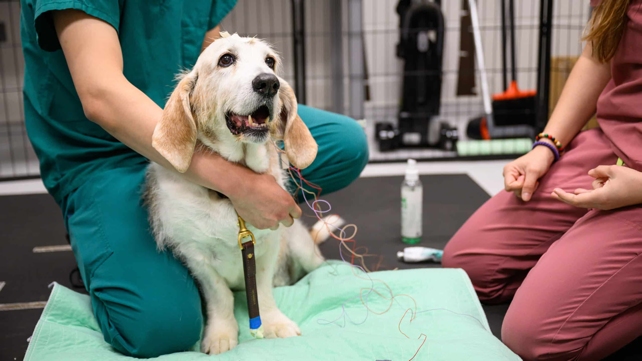Canines are cluing-in scientists to the sleep science of dementia.
When old dogs with cognitive difficulties were monitored in sleep clinics, scientists found they experienced many of the same disruptions as people with Alzheimer's disease.
Our furry friends are also plagued by shallow, interrupted sleep in old age.
When researchers at North Carolina State University (NCSU) and colleagues from Argentina and Hungary recorded the brain waves of 28 senior dogs during a two-hour nap, they noticed some intriguing sleep cycle activity.
Similar to people with Alzheimer's, male and female dogs with marked cognitive issues napped less and less deeply than those who did not show cognitive decline.

Specifically, dogs with signs of dementia showed stronger beta wave activity while napping, which is tied to wakefulness.
NCSU veterinary neurologist Alejandra Mondino says this means that the dogs' brains aren't really sleeping – or, at least, not entirely.
What's more, dogs with signs of dementia seemed to experience a significant loss in slow-wave sleep.
"In people, slow brain oscillations are characteristic of SWS and linked to the activity of the so-called glymphatic system, a transport system that removes protein waste products from the cerebrospinal fluid," explains veterinary neurologist Natasha Olby from NCSU.
"The reduction in slow oscillations in people with Alzheimer's, and the associated reduced removal of these toxins, has been implicated in their poorer memory consolidation during deep sleep."
Perhaps the same goes for our pets. More research is needed to confirm that hunch, but gathering evidence suggests dogs may be a good model for research on Alzheimer's disease.
In 2002, scientists noticed that the daily sleep-wake pattern of a dog was "dramatically altered" in senior canines. Yet past studies like this one relied on surgically implanting electrodes into a dog's brain.
The current experiment established a non-invasive and ethical alternative, all while using the gold standard technique for sleep evaluation in humans.
This requires attaching an electroencephalogram (EEG) to a dog's head while it naps. The instrument then records brain waves from outside the skull.
Ultimately, the dogs that napped longer were also the ones that problem-solved better in a detour task. This task involved a barrier in front of a path to a goodie. Dogs were scored on how well they got around the barricade.
The findings confirm what dog owners have been noticing for years: Older pets with cognitive decline tend to suffer more from sleep difficulties and daytime sleepiness.
It could be that these sleep disturbances are triggering cognitive decline, but it could also be true that the cognitive decline is causing the sleep disturbances. In all probability, researchers suspect it's a bit of both.
Researchers now plan to monitor this vicious cycle in younger dogs as they age. That way, they can search for early markers of cognitive decline in pets that could also be relevant to their owners.
"Hopefully, therapeutic trials in dogs will help to direct our choices of treatment development for people," says Olby.
The study was published in Frontiers in Veterinary Science.
